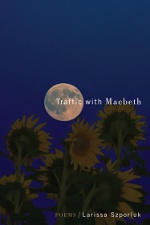Larissa Szporluk: Traffic with Macbeth
We have come to expect the world from poetry, in an every atom sort of way. For better or worse, poetry has become accountable to the vast compendiums of globalized myth, contemporary physics, and the Internet. In order to survive, the poem in its tiny ink must also offer a window into everything. Larissa Szporluk—whose name cannot help but always conjure for the reader its slant rhyme, warlock—is a poet who seeks to answer to this. In her latest collection of poems, Traffic with Macbeth, Szporluk demonstrates for us her own poetic periodic table of elements. Skin and womb, crickets and water, motherliness and eternity—these are the most basic structures of the world rendered in Traffic with Macbeth. They are terrifying, they are pleasing, but above all they are true. The book is arranged in four sections better termed "movements." While Szporluk's poems could be characterized by a number of the poems' titles—"Witch-Catalogue," "Nocturnal Council," etc.—they are above all else a series of dark interior monologues spoken from the mythic and the animal to the entirely human. "Was / the universe once / vigilant?" Szporluk asks in the poem "Mortar." If it ever was not, it is now.
In reading Szporluk's new poems, we are made more aware of our tongues, and therefore, of our heavy bodies. In "Orrido," she writes, "When / taste was gone, Time / ate his children too. / And so did God, and so will you." It is this sort of intuitive triple mirroring—among Time and God and Us—that enables her poems to embody the proverbial "all." Or in the poem "Nihilist," we are made to eat the same earth that covers our dead: "If I pushed my face / into the dirt and gulped, / I could wash this shame / a little off." Here is a banquet. Here is a banquet haunted by ghosts. Just as Szporluk's title would suggest, there is great commerce between her vicious lyrics and Shakespeare's Scottish play. On the metrical level, the phantom of blank verse's iambic line waits quietly in the shadows. Though the meter is often disguised by enjambment and caesura, many of the poems in Traffic with Macbeth fall into iambics of varying feet. Most notable is the poem "Baba Yaga," whose long tercets bring to mind Plath's famous villanelle "Mad Girl's Love Song." It begins with full iambic pentameter in the first line:
˘ ´ ˘ ´ ˘ ´ ˘ ´ ˘ ´
I cooked | my lit|tle child|ren in | the sun.
The poem continues in loose iambics with varying feet, returning at times to strict blank verse. Such a strong beat brings to mind not only Shakespeare's plays, but also the magic soundings of a spell. We are, to say the least, enchanted by the rhythm, so that when we come to the final line of the poem and when it reverses the metrical trope to trochaic pentameter, we are ready to accept the words it carries with it:
´ ˘ ´ ˘ ´ ˘ ´ ˘ ´ ˘
the second / split and | I was | witch but | still your | mother.
As the witch turns to mother, the meter also completes its seemingly impossible reversal. Szporluk, at her best, is thus a peddler of sounds with an alchemical capability—they can turn a monster such as Baba Yaga into something as familiar and warm as a mother.
The invocation of "mother" brings to mind Lady Macbeth, and so we come at last to the bloody hands. For what is Macbeth without its regicide? The word "traffic" comes to us from the Latin "trafficare," meaning "to rub across." It is then perhaps not too difficult to say that Szporluk's poems masterfully echo Lady Macbeth's line in Act V, Scene 1, "Out, damned spot! out, I say!" As if, in writing, Szporluk recognizes that "when the blood leaves" so too will the world.
 Larissa Szporluk
Larissa Szporluk